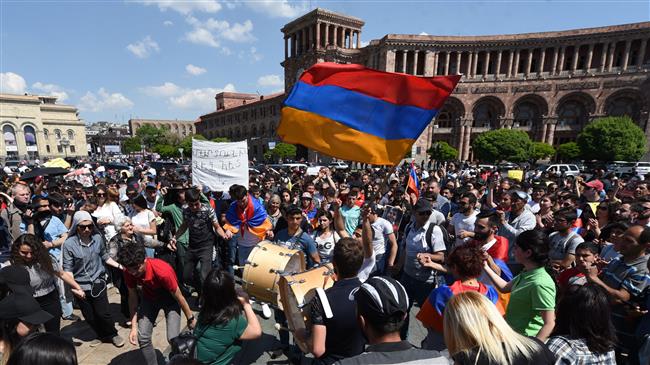Armenia opposition leader Pashinyan formally nominated for prime minister by supporters
Armenian anti-government protest leader Nikol Pashinyan has been formally nominated for the post of prime minister by his supporters, after two weeks of mass rallies in the South Caucus nation and a day before parliament votes on a new head of government.
The announcement was made before journalists and reporters in parliament on Monday as Pashinyan’s Elk (Way Out) coalition was engaged in talks with other Armenian political factions on the country’s political crisis.
Tens of thousands of opposition supporters had rallied in the Armenian capital Yerevan a day earlier, hoping that the move would propel their leader to power in the crucial parliamentary vote on May 1.
The 42-year-old opposition leader told the massive gathering of his supporters that he was ready for the role.
"Looking into your eyes, I can say that yes, I am ready -- with a great sense of responsibility -- to assume the prime ministerial duties," Pashinyan said.
Daily protests over the past two weeks forced the resignation of Republican Party veteran Serzh Sargsyan as prime minister and led to the ruling party’s announcement that it will not nominate its own candidate to replace him in a bid to calm tensions.
Pashinyan, now the only candidate running for the post of Armenia’s prime minster, says he can rid the former Soviet Republic of political and economic crises.
Speaking to journalists later on Monday, Pashinyan called for fair elections as he met parliamentary fractions in Yerevan.
"It is obvious for everyone that fair elections are needed but election time and dates are still unknown. This decision cannot be made unilaterally; we should discuss it with other parliamentary fractions and with Republican Party of Armenia (RPA) and find a compromise option,” he said.
“But there is a more important principle - to make sure that we did everything we could to hold fair, people's elections. We should hold elections which will not give a reason to doubt them. They will be legitimate elections,” he added.
Sargsyan, who became prime minister on April 17 after serving a decade as president in what was seen by his opponents as a power grab, resigned last week after days of protests, saying he had failed to tackle a litany of problems like corruption, poverty and the influence of oligarchs.
Armenia’s new president, Armen Sarkissian, was sworn in earlier this month, but he has much less power under controversial 2015 amendments to the constitution and the new governance system, where the presidency is largely a ceremonial position.
To be elected as prime minister, Pashinyan will need at least 53 votes from the 105-seat parliament.
The European Union has expressed support for Armenia and its efforts to build a “prosperous and democratic society,” calling for restraint and responsibility on all political factions.
‘All wars have rules. All of those rules have been broken’ by Israel
VIDEO | Report flags India’s violation of rights of Rohingya detainees
Turkey's foreign minister meets Syria's de facto leader in Damascus
'Next to impossible' to rescue patients from Gaza's Kamal Adwan Hospital: Director
VIDEO | Vietnam current prosperity
Report blames gasoil exports for shortage at Iranian power plants
VIDEO | Hind Rajab Foundation names Israeli war criminals vacationing after Gaza genocide
VIDEO | Australians rally for Gaza ahead of Christmas festivities
















 This makes it easy to access the Press TV website
This makes it easy to access the Press TV website